Eyal Zussman and colleagues point out that researchers have tried for years to develop wound repair materials from natural proteins, hoping that such fibers would be more compatible with body tissue than existing materials. Scientists recently focused on producing these fibers through "electrospinning," a high-tech weaving process that uses electrical charges to draw out nano-sized fibers from a liquid. But the approach has achieved poor results until now.

Natural protein from cow's blood may lead to improved sutures and bandages for treating wounds. Credit: American Chemical Society.
In the new study, the scientists describe a new method for producing electrospun polymers using bovine serum albumin (BSA), a so-called "globular" protein found in cow's blood. BSA is similar to serum albumin, one of the most abundant proteins in the human body. The method involves adding certain chemicals to a solution of BSA to loosen the bonds that hold these highly-folded proteins together. That results in a thinner, more spinnable protein solution. Using electrospinning, the process resulted in strong fibers that are easily spun into suture-like threads or thick mats resembling conventional wound dressings.
This approach is being followed by the groups of Zvi Nevo and Abraham Katzir at Tel-Aviv University, the researchers said, noting that the new method also can be applied to other types of natural proteins.
Article: Yael Dror,Tamar Ziv, Vadim Makarov, Hila Wolf, Arie Admon, and Eyal Zussman, 'Nanofibers Made of Globular Proteins', Biomacromolecules, 9 (10), 2749–2754, 2008. 10.1021/bm8005243






Comments